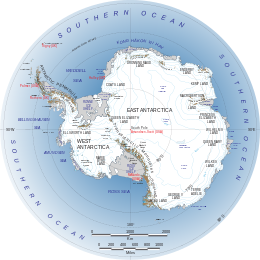Antarctica is the southernmost continent on Earth. While Antarctica has never had a permanent human population, it has been explored by various groups, and many locations on and around the continent have been described. This page lists notable places in and immediately surrounding the Antarctic continent, including geographic features, bodies of water, and human settlements.
 | |
| Coordinates | 80°S 90°E / 80°S 90°E |
|---|---|
| Area | Ranked 2nd (unofficially) |
| • Total | 14,000,000 km2 (5,400,000 sq mi) |
| • Land | 100% |
| • Water | 0% |
| Coastline | 17,968 km (11,165 mi) |
| Borders | No land boundaries |
| Highest point | Vinson Massif, 4,897 m (16,066 ft) |
| Lowest point | Bentley Subglacial Trench, −2,555 m (−8,382.5 ft) |
| Longest river | Onyx River, 25 km |
| Largest lake | Lake Vostok, 26,000 sq m (est.) |
| Climate | subantarctic to antarctic |
| Terrain | ice and barren rock |
| Natural resources | krill, fin fish, crab |
| Natural hazards | high winds, blizzards, cyclonic storms, volcanism |
| Environmental issues | depleting ozone layer, rising sea level |
Bodies of water
editAntarctica is a desert, receiving very little annual precipitation.[1] However meltwater from the continent's ice features produce a number of rivers and streams. A list of these can be found at List of rivers of Antarctica
Ice
editNearly all of Antarctica's surface is covered by ice to an average depth of 1.9 km (1.2 mi; 6,200 ft).[2] As such, a number of notable ice features have been described on the continent.
Ice shelves
editIn many places, continental ice sheets extend from the continent forming massive ice shelves.
A list of Antarctic ice shelves can be found at List of Antarctic ice shelves.
Ice streams
editIslands
editA large number of islands surround Antarctica. For a list of them, see List of Antarctic and subantarctic islands.
Geographic features
editRidges and rock features
editMountains and hills
editThere are a number of mountain lists for Antarctica:
To be added to lists are:
- Alexander Peak, Haines Mountains, Ford Ranges, Marie Byrd Land
- Atwater Hill
- Brand Peak
- Buennagel Peak, Haines Mountains, Ford Ranges, Marie Byrd Land
- Buettner Peak, Mount Murphy massif, Marie Byrd Land
- Buggisch Peak, Edson Hills, in the Heritage Range, Ellsworth Mountains, Marie Byrd Land.
- Lester Peak, Edson Hills, in the Heritage Range, Ellsworth Mountains, Marie Byrd Land.
- Mount Arrowsmith
- Mount Atholl
- Mount Axtell
- Mount Boda
- Mount Bodys
- Mount Brading
- Mount Murphy massif, Bucher Peak, Marie Byrd Land
- Mount Byerly, Marie Byrd Land
- Pirrit Hills
Volcanoes
editAntarctica has a number of active and extinct volcanoes. For a list of them, see List of volcanoes in Antarctica.
Human settlements
editAntarctica has no permanent human population, however there are a variety of man-made places in Antarctica including two civilian bases.
Lighthouses
editResearch stations
editReferences
edit- ^ Joyce, C. Alan (18 January 2007). "The World at a Glance: Surprising Facts". The World Almanac. Archived from the original on 4 March 2009. Retrieved 7 February 2009.
- ^ British Antarctic Survey (2013). "Bedmap2: improved ice bed, surface and thickness datasets for Antarctica" (PDF). The Cryosphere Journal. 7 (1): 390. Bibcode:2013TCry....7..375F. doi:10.5194/tc-7-375-2013. Retrieved 6 January 2014.